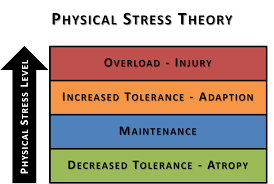Physiology and Healing in Sport: Difference between revisions
No edit summary |
No edit summary |
||
| Line 1: | Line 1: | ||
Stress | |||
''larity, in the current review, stress is defined according to the definition provided by Selye (1956), as a challenge or stimulus and is separate from the physiological reactivity that follows in response to the stress or challenge. Thus, a stressor is anything that leads to physiological stress reactivity. The intensity of the physiological reaction to a stressor is therefore highly individual and situationally dependen''<ref>Anderson GS, Di Nota PM, Metz GA, Andersen JP. [https://www.frontiersin.org/articles/10.3389/fpsyg.2019.02501/full The impact of acute stress physiology on skilled motor performance: Implications for policing.] Frontiers in psychology. 2019 Nov 7;10:2501.</ref> | |||
''t has been suggested that proper manipulation of RT variables (e.g., load, volume, rest, and frequency) can optimize muscle hypertrophic response<ref>Scarpelli MC, Nóbrega SR, Santanielo N, Alvarez IF, Otoboni GB, Ugrinowitsch C, Libardi CA. [https://journals.lww.com/nsca-jscr/Fulltext/2022/04000/Muscle_Hypertrophy_Response_Is_Affected_by.40.aspx Muscle hypertrophy response is affected by previous resistance training volume in trained individuals.] Journal of Strength and Conditioning Research. 2022 Apr 8;36(4):1153-7.</ref>'' | |||
''Maintaining a sufficient stimulus to match adaptive capacity is termed progressive overload. hile the term progressive overload refers to “the gradual increase of stress placed on the body during resistance training''<ref>Plotkin D, Coleman M, Van Every D, Maldonado J, Oberlin D, Israetel M, Feather J, Alto A, Vigotsky AD, Schoenfeld BJ. [https://peerj.com/articles/14142/ Progressive overload without progressing load? The effects of load or repetition progression on muscular adaptations]. PeerJ. 2022 Sep 30;10:e14142.</ref> | |||
Revision as of 15:11, 9 December 2022
Stress
larity, in the current review, stress is defined according to the definition provided by Selye (1956), as a challenge or stimulus and is separate from the physiological reactivity that follows in response to the stress or challenge. Thus, a stressor is anything that leads to physiological stress reactivity. The intensity of the physiological reaction to a stressor is therefore highly individual and situationally dependen[1]
t has been suggested that proper manipulation of RT variables (e.g., load, volume, rest, and frequency) can optimize muscle hypertrophic response[2]
Maintaining a sufficient stimulus to match adaptive capacity is termed progressive overload. hile the term progressive overload refers to “the gradual increase of stress placed on the body during resistance training[3]
Physical Stress Theory
- Biological tissues adapt to changes in the levels of applied stress
- Maintaining tissue tolerance is essential to prevent atrophy, whereas overloading results in hypertrophy
- Excessively high levels of stress lead to tissue injury and potential permanent damage
- The magnitude, time, and direction of stress application determine the overall level of exposure to physical stress
- Injury may occur due to a high-magnitude stress applied for a brief period, a low-magnitude stress applied for a long duration, and/or a moderate-magnitude stress applied to the tissue man[4]
General Adaptation[edit | edit source]
Resources[edit | edit source]
- General Principles of Exercise Rehabilitation
- Principles of Exercise Physiology and Adaptation
- Neuromuscular Adaptations to Exercise
- Bone Healing
- Soft Tissue Healing
References[edit | edit source]
- ↑ Anderson GS, Di Nota PM, Metz GA, Andersen JP. The impact of acute stress physiology on skilled motor performance: Implications for policing. Frontiers in psychology. 2019 Nov 7;10:2501.
- ↑ Scarpelli MC, Nóbrega SR, Santanielo N, Alvarez IF, Otoboni GB, Ugrinowitsch C, Libardi CA. Muscle hypertrophy response is affected by previous resistance training volume in trained individuals. Journal of Strength and Conditioning Research. 2022 Apr 8;36(4):1153-7.
- ↑ Plotkin D, Coleman M, Van Every D, Maldonado J, Oberlin D, Israetel M, Feather J, Alto A, Vigotsky AD, Schoenfeld BJ. Progressive overload without progressing load? The effects of load or repetition progression on muscular adaptations. PeerJ. 2022 Sep 30;10:e14142.
- ↑ Mueller MJ, Maluf KS. Tissue adaptation to physical stress: a proposed “Physical Stress Theory” to guide physical therapist practice, education, and research. Physical therapy. 2002 Apr 1;82(4):383-403.







